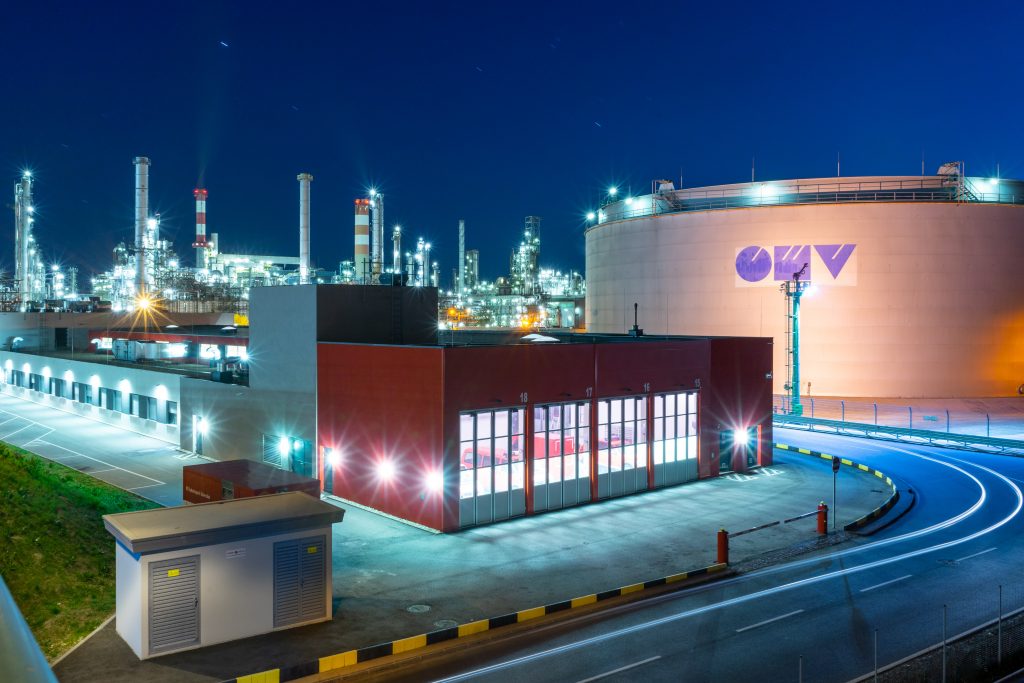Oil refiners process crude oil into mainly motor gasoline and distillates such as diesel and heating oil, but also many other oil products. Let’s have a look into the range of finished oil products produced in a typical refinery.
By finished products, we mean that these are ready to be sold and used by final consumers. Conversely, intermediate products such as naphtha would require further processing.

Main Finished Products Categories
There are 4 main categories of finished products, from lighter to heavier:
- Petroleum gases: includes natural gas, and natural gas liquids.
- Light-ends: includes naphthas, and gasolines.
- Middle-distillates: includes kerosenes, and light fuel oils / gas oils.
- Heavy ends: includes heavy fuel oils, and specialty products.
Let’s talk about these finished products categories one by one, and examine their related finished products.

Petroleum Gases
Methane
Methane is a main component of natural gas, which is then used in domestic gas supply for cooking, heating and electricity generation.
Ethane
Ethane is mostly used in petrochemical processes and particularly in the production of ethylene, but also as a refinery fuel and refrigerant gas.
Propane
Propane is also mainly used in the petrochemical industry, as well as the primary component of liquefied petroleum gas (LPG), which is a common source of domestic cooking and heating fuel.
Butanes
Butanes are mainly deployed as a blendstock for gasolines and minor component of liquefied natural gas (LPG).

Light Ends
Naphtha is a generic term for the petroleum products that have a boiling range of 30-200C approximately.
Naphthas are mainly used to adjust the octane of gasoline, as feedstocks for petrochemical production of plastics, and in the production of fertilizers.
Light Naphtha
Light Naphtha is a primary feedstock in the Asian petrochemical industry, as it is more cost-competitive than NGLs and easier to transport logistically.
Heavy Naphtha
Heavy naphtha can be used as a blendstock for gasoline, as well as in the production of fertilizers, solvents, and camping fuel/ lantern fuel.
Motor Gasoline
Motor gasoline refers to the ubiquitous fuel for spark-plug ignition internal combustion piston engines. In some areas is called petrol or benzine/benzol.
Aviation Gasoline
Aviation gasoline is used in spark-plug ignition piston engines of light general aviation (GA) aircrafts.
Jet Fuel
Jet fuel is used in the larger more commonly deployed jet fuel aircrafts.
Gas Turbine Fuel
Gas turbine fuel is used to generate power (electricity) in a process using the same principle as a jet engine.
Kerosene
Kerosene is mostly used for heating, lighting, and cooking. Anecdotally, kerosen was originally the most commonly produced petroleum product.
Diesel Fuels
Diesel fuels power diesel engines in automobiles as well as marine diesel compression-ignition engines, which have no spark plugs and instead rely on the piston compressing and heating air.
Light Fuel Oil
Light fuel oil, aka burner fuel, is generally used in domestic and industrial heating with open flame burners. Alternatively, it can be used in the generation of electrical power.

Heavy Ends
Residual Fuel Oil
The main use of fuel oil is in marine engines of oceangoing vessels, where the route is well away from the coast because this oil contains high doses of sulfur, which is terribly polluting. There is a secondary use of residual fuel oil to generate electrical power.
Base Oils & Lubricants
Base oils, which are also known as base stock, are the main ingredient in the manufacturing of finished lubricants and greases.
Waxes
Waxes, aka petroleum waxes or mineral waxes, are commonly used to produce candles, waterproof packaging, but also fruit and cheese coatings, floor polish, portable fuels, crayons, and even chewing gum.
Bitumen
Bitumen is a heavy, viscous liquid refinery product that is commonly used in asphalt, road oil, and road surfacing and roofing. While it is sometimes called asphalt, bitumen is only a part of asphalt, so the names are not exchangeable.
Petroleum Coke
Petroleum coke is mostly carbon, which is thus used widely as a fuel in steel smelting, cement manufacturing, and power generation.
Carbon Black
Soot, aka as carbon black, is a black powder produced when residual fuel is subject to extremely high temperatures. It is primarily used as a reinforcing agent in rubber tires or in the manufacture of ink.
Oil Refining Nowadays
While the oil industry is among the world’s largest, it’s also one of the most deeply related to climate change.
Will crude oil refiners such as Total, BP, ExxonMobil or Shell remain as powerful as they are today in 10, 30, or 50 years?
We don’t know, but certainly the energy industry will transition towards are more sustainable approach including renewable energy such as wind power, biofuels, and solar power.








